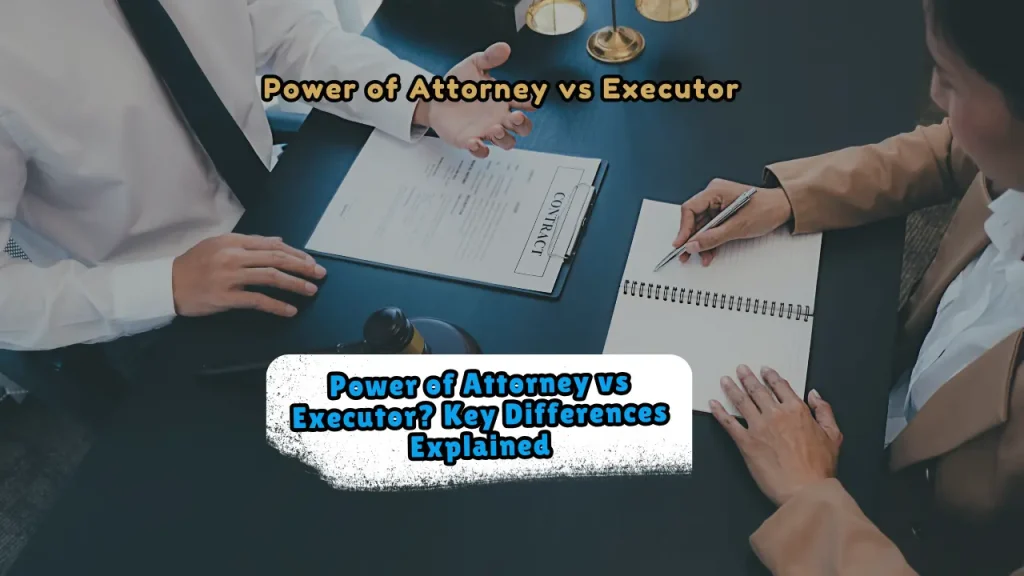Power of Attorney vs Executor? Key Differences Explained
When planning for life’s uncertainties or managing affairs after death, two critical roles often come into play: Power of Attorney (POA) and Executor. While both involve legal authority to act on someone else’s behalf, they serve distinct purposes. Below is a clear breakdown of their differences, responsibilities, and when each is used.
Quick Answer
A Power of Attorney grants authority to someone to act on your behalf while you’re alive (e.g., manage finances or healthcare). An Executor is appointed in a will to manage your estate after you die (e.g., distribute assets, pay debts).
Table of Contents
What Is a Power of Attorney?
A Power of Attorney is a legal document that allows you (the “principal”) to designate an agent (or “attorney-in-fact”) to make decisions for you during your lifetime.
Types of POA
- General POA: Broad authority over financial/legal matters (ends if you become incapacitated).
- Durable POA: Remains valid even if you’re incapacitated (commonly used for long-term planning).
- Healthcare POA: Specific to medical decisions (also called a “medical proxy”).
- Limited POA: Restricted to specific tasks or time periods.
Key Features:
- Authority begins immediately or when triggered (e.g., incapacity).
- Terminates at death or revocation by the principal.
- Governed by state laws (requirements vary—e.g., some states require notarization).
What Is an Executor?
An Executor (or “Personal Representative”) is named in a will to carry out your wishes after your death. They are responsible for:
- Managing your estate’s assets
- Paying debts and taxes
- Distributing inheritances to beneficiaries
- Handling probate court requirements
Key Features:
- Authority begins only after death.
- Must be approved by the probate court.
- No legal power while you’re alive.
Related article for you:
Special Power of Attorney to Sell Property: Template & Guide

Key Differences at a Glance
| Factor | Power of Attorney | Executor |
| When Active | During your lifetime | After your death |
| Scope of Authority | Financial, legal, or healthcare decisions | Estate management and probate process |
| Appointment | Through a POA document | Named in a will |
| Legal Oversight | Rarely requires court involvement | Requires probate court approval |
| Duration | Ends at death or revocation | Ends when estate is settled |
When Do These Roles Overlap?
While POA and Executor roles are separate, confusion arises when:
- The same person holds both roles: A spouse might serve as POA during your life and Executor after death.
- An Executor tries to act before death: An Executor has no authority until you pass away.
- A POA continues after death: All POA authority terminates immediately at death.
Real-Life Example:
In 2023, a Texas court case (Estate of Johnson v. Merrill) highlighted this distinction. A daughter acting as her father’s POA tried to access his bank accounts after his death, but the bank refused. The court ruled that her POA authority ended at his death, and only the Executor (her brother) could manage the accounts.
Common Questions
1. Can a Power of Attorney Transfer Assets After Death?
No. POA authority ends at death. Only the Executor or court-appointed administrator can handle post-death asset distribution.
2. Does an Executor Need a POA?
No. Executors derive authority from the will and probate court, not a POA.
3. What If There’s No Will or POA?
- During life: A guardian may need court appointment if you’re incapacitated.
- After death: The court appoints an administrator (similar to an Executor).
Why Both Roles Matter
- POA: Protects you if you’re unable to manage affairs due to illness or injury.
- Executor: Ensures your estate is handled according to your wishes.
Legal Expert Insight:
“A Power of Attorney is like a ‘life raft’ for incapacity, while an Executor is the ‘captain’ who steers your estate after you’re gone. You need both for full protection.”
— Amanda Smith, Estate Planning Attorney (American Bar Association)
How to Set Up Both
- Create a Durable POA: Designate someone you trust to act if you’re incapacitated.
- Name an Executor in Your Will: Choose someone organized and detail-oriented.
- Update Documents: Review both every 3–5 years or after major life changes.
For state-specific forms, visit your state’s court website (e.g., California Courts or New York State Bar Association).
Final Tips
- Communicate Clearly: Ensure your POA agent and Executor understand their roles.
- Store Documents Safely: Keep originals accessible to avoid delays.
- Consult a Lawyer: Complex estates or blended families may require professional guidance.
By understanding these distinctions, you can ensure your affairs are managed seamlessly—both during your life and after.
About the Author

Sarah Klein, JD, is an experienced estate planning attorney who has helped clients with wills, trusts, powers of attorney, and probate matters. At All About Lawyer, she simplifies complex estate laws so families can protect their assets, plan ahead, and avoid legal headaches during life’s most sensitive moments.
Read more about Sarah
